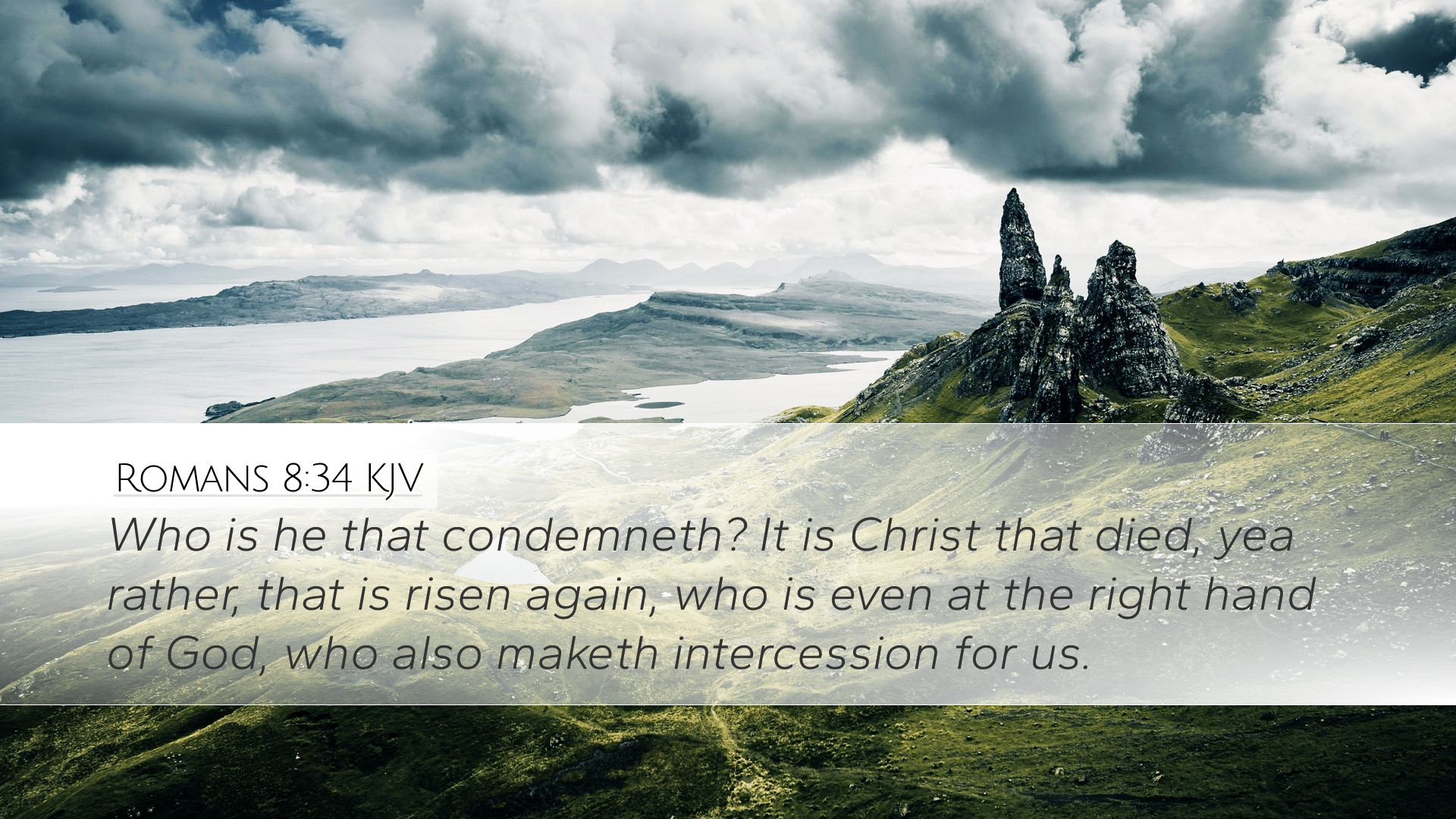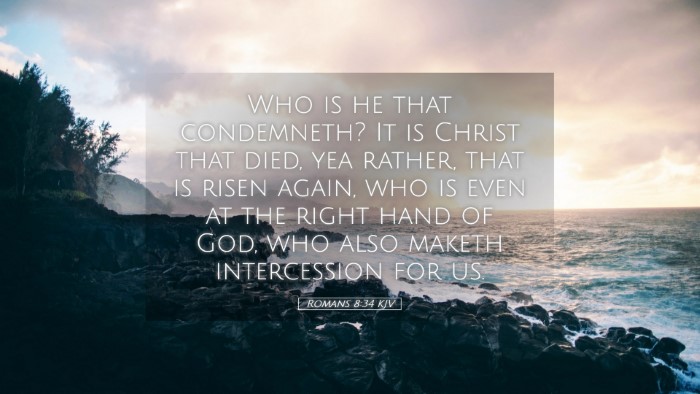Commentary on Romans 8:34
Romans 8:34 states: "Who is he that condemns? It is Christ that died, yea rather, that is risen again, who is even at the right hand of God, who also makes intercession for us."
Introduction
This verse forms a crucial part of Paul’s theological argument in the book of Romans, particularly in Chapter 8, where he speaks of the security of believers in Christ. The depth of this scripture is best appreciated through a synthesis of insights drawn from prominent public domain commentaries.
Contextual Background
Paul's epistle to the Romans addresses both Jews and Gentiles, outlining the fundamentals of Christian faith. Chapter 8 encapsulates the triumphant assurance of salvation and the believer's security in Christ. Understanding the surrounding verses and overall themes helps to illuminate the significance of Romans 8:34.
Matthew Henry's Commentary
Matthew Henry emphasizes the completeness of Christ’s work. He points out that, following Christ’s sacrificial death, believers are fundamentally declared righteous through faith. He notes:
- Christ's Sacrifice: Henry asserts that Christ’s death and resurrection are pivotal. The resurrection is the Father’s declaration that the sacrifice was accepted, affirming the victory over sin and death.
- Defense Against Accusation: Henry highlights that Christ, having accomplished salvation, stands in defense of believers. There can be no condemnation, for He who is our Savior is also our intercessor.
Albert Barnes' Commentary
Albert Barnes provides a practical exposition of the verse, focusing on the implications of Christ's intercession. His notes elucidate the following key points:
- The Role of Christ: Barnes remarks on Christ's elevation to the right hand of God, symbolizing His authority and proximity to the Father. This position underscores His power to intercede effectively for the faithful.
- Assurance of Salvation: Barnes underscores that the rhetorical question "Who is he that condemns?" serves to reassure believers of their salvific security. If the highest judge, in Christ, declares them justified, who can bring charges against them?
Adam Clarke's Commentary
Adam Clarke’s insights offer a blend of theology and pastoral care, focusing on the practical implications for the believer:
- Intercessory Role: Clarke elaborates on the nature of Christ's intercession, portraying it as an ongoing work. He emphasizes that Christ not only prayed for His disciples but continually advocates for them before the Father.
- The Assurance Provided: He highlights the comfort this brings to believers, reminding them that even though they may face accusations, they can find solace in knowing that Christ stands as their defender.
Theological Implications
Understanding Romans 8:34 carries significant theological weight for various areas, including soteriology (the study of salvation), Christology (the study of Christ), and ecclesiology (the study of the Church).
Soteriology
The doctrine of salvation is profoundly impacted by this verse. The assurance of no condemnation reverberates through the heart of Christian doctrine, affirming that salvation is secured in Christ, not by human effort.
Christology
Jesus’ role is crucial in the believer’s relationship with God. The dual emphasis on His death and resurrection illustrates the completion of His redemptive work and ongoing intercessory ministry.
Ecclesiology
The Church is presented as a body that stands justified, as Paul emphasizes the collective identity of believers in Christ. Their security thus underpins the community’s mission and witness.
Pastoral Application
For pastors and theologians, Romans 8:34 serves as a profound source of encouragement and assurance. During times of discouragement or doubt, this verse can provide believers with the comfort that their standing with God is secure, grounded in the victorious work of Jesus Christ.
Encouragement to Believers
This verse reassures believers that their salvation is not tenuous. It emphasizes grace over merit and invites the faithful to trust in Christ’s advocacy.
Challenge for the Unbeliever
For those outside the faith, the verse serves as a call to recognize the need for Christ as the mediator. The necessity for acceptance of His sacrifice is underscored by the assurance found in His resurrection and intercession.
Conclusion
In summarizing Romans 8:34, it becomes evident that the Christian faith is built upon the foundation of Christ’s work—His death, resurrection, and ongoing intercession. These elements assure believers of their justification and secure standing with God. As we contemplate this powerful verse, may we find renewed faith and commitment to share the gospel’s transformative message.


